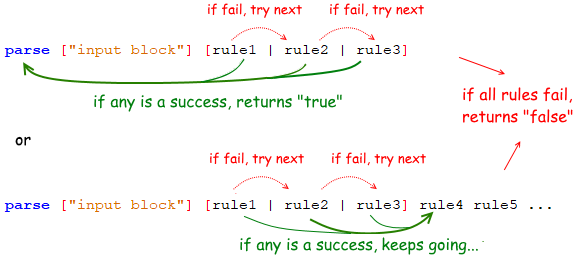Parse - Ordered Choices
Rules accept a "ordered choice" operator, represented by "|":
If a block of rules separated by "|" is found by parse, it will try each rule, from left to right until it finds a match, returning success and going to the next rule after the block. If none of them is a match, of course, it fails and the parsing is stopped returning false.

This is similar to a logic "or" operator, but order matters.
Example1:
Red[]
a: ["fox" "rat" "elk"]
b: ["fox" "owl" "elk"]
print parse a [
"fox"
["rat" | "owl"] ;notice enclosing brackets
"elk"
]
print parse b [
"fox"
["rat" | "owl"| "cat" | "whatever"]
"elk"
]
true
true
Example2:
Red[]
print parse ["this is a string"] [ integer! (print "integer") | string! (print "string") | char! (print "char")]
string
true

Example3:
Red[]
a: ["string" 3 #"A"] ; that is a string!, an integer! and a char!
print parse a [integer! (print "I") | string! (print "S") | time! (print "T")]
S
false
Repeating the script with parse-trace instead of print parse (color highlights, newlines, bold font and comments added by edition):
-->
match: [integer! (print "I") | string! (print "S") | time
input: ["string" 3 #"A"]
==> not matched
match: [string! (print "S") | time! (print "T")]
input: ["string" 3 #"A"]
==> matched
;keeps going to execute commands in parenthesis
match: [(print "S") | time! (print "T")]
input: [3 #"A"]
S
match: [| time! (print "T")]
input: [3 #"A"]
return: false ;too much input and not enough rules -> false
To obtain true, we may add more rules to the successful ordered choice...
Red[]
a: ["string" 3 #"A"] ; that is a string!, an integer! and a char!
print parse a [integer! (print "I") | string! (print "S") integer! char! | integer! (print "T")]
S
true
... or enclose the ordered choices in brackets and add rules to the main rule block:
Red[]
a: ["string" 3 #"A"] ; that is a string!, an integer! and a char!
print parse a [[integer! (print "I") | string! (print "S") | time! (print "T")] integer! char!]
S
true